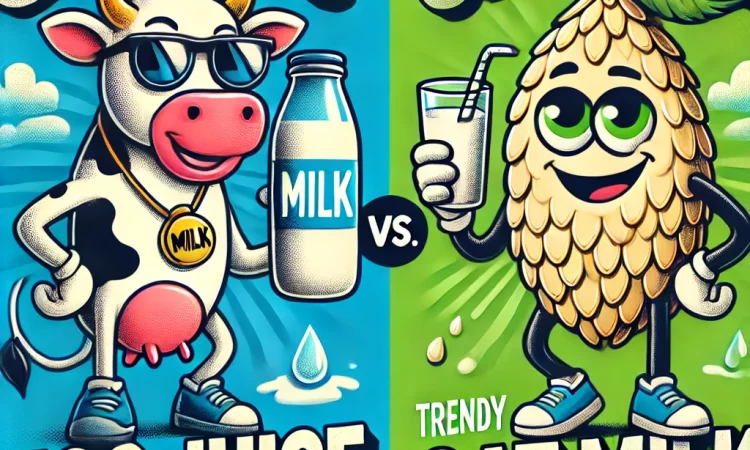Milk has been a staple in kitchens for centuries, but now oat milk is shaking up the dairy aisle like a new kid in town. Whether you’re looking to switch up your morning latte or find a milk alternative that aligns with your dietary needs, it’s time to see how these two stack up. Spoiler: Oat milk has some serious game.
1. Nutritional Face-Off: Oat Milk vs. Cow’s Milk
Let’s start with the numbers.
- Calories:
- Oat milk (unsweetened): ~120 calories per cup.
- Cow’s milk (2%): ~120 calories per cup.
Pretty neck and neck, right?
- Protein:
- Oat milk: 2–3 grams per cup.
- Cow’s milk: 8 grams per cup.
Winner: Cow’s milk. But oat milk gets an honorable mention for its fiber content (more on that below).
- Fat:
- Oat milk: Lower in saturated fat (about 1–2 grams per cup).
- Cow’s milk: Higher in saturated fat (about 3–5 grams depending on the type).
- Calcium:
- Fortified oat milk rivals cow’s milk in calcium, offering about 25–30% of your daily recommended intake.
2. Digestibility: Lactose Intolerance, Anyone?
Cow’s milk contains lactose, a sugar that many people can’t digest. Cue the bloating, cramps, and awkward tummy noises.
Oat milk, on the other hand, is naturally lactose-free, making it a tummy-friendly choice for the 68% of the world who struggles with lactose intolerance.
3. Environmental Impact: Who’s Greener?
- Cow’s Milk: Producing dairy milk requires significant resources—land, water, and energy. It also contributes to greenhouse gas emissions (thanks, methane-producing cows!).
- Oat Milk: Oats are eco-friendly superheroes. Producing oat milk uses less water and creates a smaller carbon footprint compared to cow’s milk.
For the planet-conscious consumer, oat milk is a clear winner.
4. Fiber Content: Oats for the Win
Cow’s milk is many things, but a source of fiber it is not. Oat milk, however, has about 2 grams of dietary fiber per cup, which can help keep your digestion on track and your heart happy.
5. Allergen-Friendly
If you’re dodging dairy, nut, or soy allergies, oat milk might just be your new best friend. Just be sure to check the label for potential cross-contamination if you’re sensitive to gluten.
6. Taste and Versatility
- Cow’s Milk: It’s rich, creamy, and iconic in coffee, cereal, and baking. But let’s face it—it’s not for everyone.
- Oat Milk: Creamy and slightly sweet, oat milk has a neutral flavor that shines in lattes, smoothies, and even soups. Plus, it froths like a dream, making baristas everywhere swoon.
7. Cost Comparison
Cow’s milk is generally cheaper, but oat milk prices are coming down as it grows in popularity. If you’re on a budget, making your own oat milk at home is a fun and cost-effective option (check out our DIY oat milk recipe).
Who Should Choose What?
- Stick with Cow’s Milk if:
- You need high protein content.
- You love the taste and don’t have dietary restrictions.
- Switch to Oat Milk if:
- You’re lactose intolerant or vegan.
- You’re eco-conscious.
- You love fiber-packed, creamy, plant-based goodness.
Final Sip: The Oat Milk Revolution
While cow’s milk has its merits, oat milk is proving to be a worthy contender. It’s kinder to the environment, gentler on your stomach, and surprisingly versatile in the kitchen. So, whether you’re a plant-based enthusiast or just looking for a change, oat milk is here to shake things up—one creamy cup at a time.
What’s in your fridge: the classic moo juice or the trendy oat elixir? Let us know in the comments!





